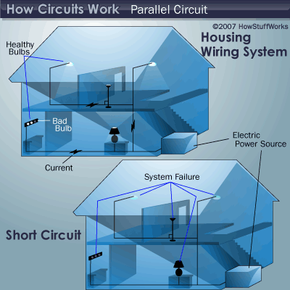Types of Circuits
A closed circuit has a complete path for current to flow. An open circuit doesn't, which means that it's not functional. If this is your first exposure to circuits, you might think that when a circuit is open, it's like an open door or gate that current can flow through. And when it's closed, it's like a shut door that current can't flow through. Actually, it's just the opposite, so it might take awhile to get used to this concept.
A short circuit is a low-resistance path, usually made unintentionally, that bypasses part of a circuit. This can happen when two bare wires in a circuit touch each other. The part of the circuit bypassed by the short circuit ceases to function, and a large amount of current could start to flow. This can generate a lot of heat in the wires and cause a fire. As a safety measure, fuses and circuit breakers automatically open the circuit when there is an excessive current.
Advertisement
In a series circuit, the same current flows through all the components. The total voltage across the circuit is the sum of the voltages across each component, and the total resistance is the sum of the resistances of each component. In this circuit, V = V1 + V2 + V3 and R = R1 + R2 + R3. An example of a series circuit is a string of Christmas lights. If any one of the bulbs is missing or burned out, no current will flow and none of the lights will go on.
Parallel circuits are like the smaller blood vessels that branch off from an artery and then connect to a vein to return blood to the heart. Now think of two wires, each representing an artery and a vein, with some smaller wires connected between them. These smaller wires will have the same voltage applied to them, but different amounts of current flowing through them depending on the resistance of the individual wires.
An example of a parallel circuit is the wiring system of a house. A single electric power source supplies all the lights and appliances with the same voltage. If one of the lights burns out, current can still flow through the rest of the lights and appliances. However, if there is a short circuit, the voltage drops to almost zero, and the entire system goes down.
Circuits are generally very complex combinations of series and parallel circuits. The first circuits were very simple DC circuits. We'll look at the history of circuits and the difference between DC and AC on the next page.
